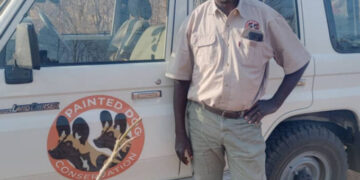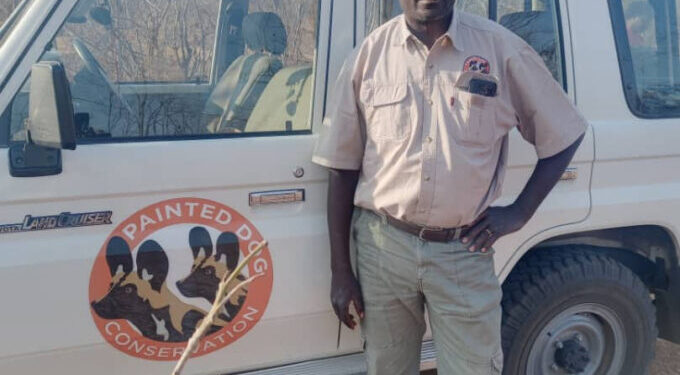Sifelani Tsiko Environment Editor
A Zimbabwean wildlife ranger – Jealous Mpofu – has won the 2023 Tusk Wildlife Ranger Award for his dedication and commitment to the protection of painted dogs which are under threat in the country.
Mpofu, 54, a chief tracker at Painted Dog Conservation (PDC) at Hwange National Park shrugged off stiff competition to clinch the highest international recognition that a ranger can receive.
He will be honoured at a gala dinner in London this week, where he will be presented with the award and a 30 000 pounds cash prize.
Prince William, Duke of Cambridge, himself an avid supporter of African wildlife conservation is expected to confer him with the award this week.
The Prince helped establish the awards in 2013.
“I am so excited to have won this award. It is for my country and more importantly my children. I hope it is going to inspire my children to take up wildlife conservation seriously,” Mpofu said in an interview.
“All my colleagues are looking forward to winning this award in future. It has inspired them and I am optimistic that they too will win the award for us in future.”
Tusk Wildlife Ranger Award is given to celebrate the dedication and commitment of an individual who works in the field on a daily basis to protect Africa’s wildlife.
This award gives international recognition to the men and women who face danger every day to protect biodiversity. Rangers often work for little reward, risking and regularly losing their lives to protect the world’s wildlife and its fragile ecosystems.
Mpofu has for more than two-and-half decades dedicated his life towards the conservation of painted dogs, also known as African Wild Dogs (Lycaon pictus).
As chief tracker at Painted Dog Conservation, Mpofu heads the team whose daily job is to track down and monitor the various study packs of painted dogs in Hwange National Park.
He is responsible for reporting the whereabouts of packs in conflict zones to anti-poaching units, leading them into areas to sweep for snares.
“I have always lived next to wildlife, growing up, we used to see wildlife coming out of the park into our community. Painted dogs have always been fascinating to me and the reality is that if we don’t do something now, these beautiful animals will be lost to humankind. I want to be part of those offering tangible solutions and actions to keep the future of painted dogs secure,” he said.
Painted dogs are the largest canids in Africa and the second largest in the world after wolves.
The dogs are an endangered species and are listed on the International Union for Conservation of Nature (IUCN) Red List of Threatened Species.
Mpofu has been at the forefront of carrying out vital work to protect painted dogs which are facing numerous threats such as poaching, habitat loss and habitat fragmentation.
“When I joined the Painted Dog Conservation organisation, locals looked at painted dogs as a menace that had to be killed. With civil education and better understanding, the local community now appreciates the value of wildlife to our lives,” he said.
“There are benefits to be enjoyed from the conservation of painted wild dogs. I have managed to send my children to school, to feed and take care of my family from the earnings I got from conserving wild dogs.
“It’s a very beautiful species. It’s a harmonious animal and we have to save it from extinction. In Zimbabwe, we have about 700 painted dogs and I will be happy if we work hard to increase the population to around 1 500.”
Mpofu has been involved in various community development work in communities dotted around Hwange National Park promoting wildlife conservation, supporting HIV and Aids programmes, drilling boreholes, nutrition gardens and promoting painted dog conservation in 26 schools in the Dete area.
Painted Dog Conservation with support from the African Wildlife Foundation has worked closely with locals to set up community-driven anti-poaching units.
Significant progress has been made in saving painted dogs from poaching and illegal hunting activities in a number of locations on the fringes of Hwange National Park.
“Understanding and tolerance of the painted dogs has improved a lot in our local communities on the edges of Hwange National Park and many have joined the Community Anti-Poaching Units we have established because people are seeing the benefits that come with tourism money,” Mpofu said.
“Painted dogs numbers have improved now. We now have five packs from just two when we started in 1998 in the buffer zone outside Hwange National Park where we operate extensively. This is the first time we have had so many packs in so many years. The numbers are also improving inside the main national parks.”
PDC spokesman Ronnie Sibanda hailed Mpofu for winning the award.
“This has been long coming and it’s a well-deserved recognition for someone like Jealous. He has selflessly given himself to the cause of painted dog conservation,” he said.
“We are so happy and humbled to have had the opportunity to work with him here. He is a really determined and dedicated man to what he does.”
Mpofu took an interest in wildlife conservation at the age of 19 when he joined the Zimbabwe Parks and Wildlife Authority (Zimparks), first working on rhino conservation programmes.
He worked as a park ranger for 10 years before joining PDC as a wildlife tracker and ranger.
His work focuses on monitoring painted dog populations, combating poaching and helping to mitigate human-wildlife conflicts.
Mpofu’s work has been vital not only to the protection of a gravely endangered species but to maintaining the rich biodiversity of the environment.
“Without people like Jealous PDC would not be like it is today. PDC is now at the heart and centre of painted dog conservation in Africa and the world as a whole,” said Sibanda.
“Mpofu’s commitment, hard work, and tenacity have earned him the respect and admiration he deserves. The international recognition he got will spur our painted dog conservation work to new heights.”
In the past, Africa had around 500 000 painted dogs but the numbers have declined to approximately 7 000 largely due to poaching, habitat loss and habitat fragmentation.
Zimbabwe has around 700 painted dogs which live in the wild – making up about 10 percent of the world’s population. – The Herald

























